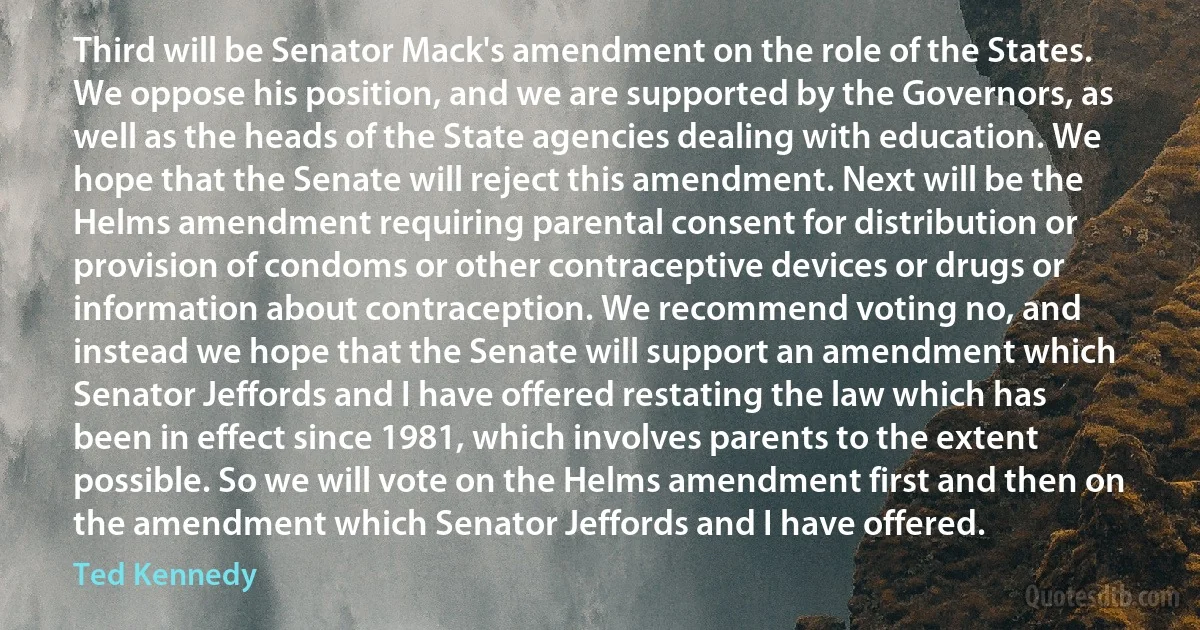
Third will be Senator Mack's amendment on the role of the States. We oppose his position, and we are supported by the Governors, as well as the heads of the State agencies dealing with education. We hope that the Senate will reject this amendment. Next will be the Helms amendment requiring parental consent for distribution or provision of condoms or other contraceptive devices or drugs or information about contraception. We recommend voting no, and instead we hope that the Senate will support an amendment which Senator Jeffords and I have offered restating the law which has been in effect since 1981, which involves parents to the extent possible. So we will vote on the Helms amendment first and then on the amendment which Senator Jeffords and I have offered.
Ted KennedyRelated topics
consent distribution education hope law next position possible requiring senate senator state support third voting well contraceptive contraception heads statesRelated quotes
Speech is an essential mechanism of democracy, for it is the means to hold officials accountable to the people. [...] The right of citizens to inquire, to hear, to speak, and to use information to reach consensus is a precondition to enlightened self-government and a necessary means to protect it. [...] By taking the right to speak from some and giving it to others, the Government deprives the disadvantaged person or class of the right to use speech to strive to establish worth, standing, and respect for the speaker's voice. The Government may not by these means deprive the public of the right and privilege to determine for itself what speech and speakers are worthy of consideration. The First Amendment protects speech and speaker, and the ideas that flow from each.

Anthony Kennedy
Justice is the end of government. It is the end of civil society. It ever has been, and ever will be, pursued, until it be obtained, or until liberty be lost in the pursuit. In a society, under the forms of which the stronger faction can readily unite and oppress the weaker, anarchy may as truly be said to reign, as in a state of nature where the weaker individual is not secured against the violence of the stronger: And as in the latter state even the stronger individuals are prompted by the uncertainty of their condition, to submit to a government which may protect the weak, as well as themselves: so in the former state, will the more powerful factions be gradually induced by a like motive, to wish for a government which will protect all parties, the weaker as well as the more powerful.

Alexander Hamilton
For what advantage is it, that the world enjoys profound peace, if thou art at war with thyself? This then is the peace we should keep. If we have it, nothing from without will be able to harm us. And to this end the public peace contributes no little: whence it is said, ‘That we may lead a quiet and peaceable life.' But if any one is disturbed when there is quiet, he is a miserable creature. Seest thou that He speaks of this peace which I call the third (inner, ed.) kind? Therefore when he has said, ‘that we may lead a quiet and peaceable life,' he does not stop there, but adds ‘in all godliness and honesty.' But we cannot live in godliness and honesty, unless that peace be established. For when curious reasonings disturb our faith, what peace is there? or when spirits of uncleanness, what peace is there?

John Chrysostom
Over the years, I've made a lot of predictions that have come true. Remember this one: two years from now, even those who supported Barack Obama most enthusiastically will be feeling a certain nostalgia about George W. Bush and secretly wishing they'd voted for John McCain.
Yeah, I know, disgusting. But that's the way the world works. Nobody alive today would willingly admit to voting for Adolf Hitler, although the third or fourth worst mass-murderer in history (behind Mao Tse Tung, Joseph Stalin, and, on a per capita basis, Pol Pot) won by a landslide. Once the outrages to come have ended and there are thousands - perhaps even millions - of Obama's crimes to account for, would you want to admit to having voted to make those crimes possible?

L. Neil Smith
To make a law final, so as not to be reached by Congress, is, by mere legislation, to fasten a new provision on the Constitution. Nay, more; it gives to the law a character which the very Constitution docs not possess. The wise fathers did not treat the country as a Chinese foot, never to grow after infancy; but, anticipating Progress, they declared expressly that their great Act is not final. According to the Constitution itself, there is not one of its existing provisions - not even that with regard to fugitives from labor - which may not at all times be reached by amendment, and thus be drawn into debate. This is rational and just. Sir, nothing from man's hands, nor law, nor constitution, can be final. Truth alone is final.

Charles Sumner
